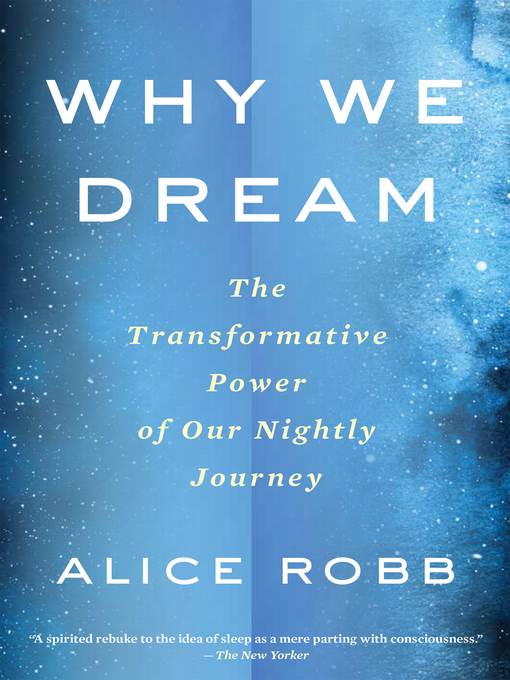
Why We Dream
The Transformative Power of Our Nightly Journey
کتاب های مرتبط
- اطلاعات
- نقد و بررسی
- دیدگاه کاربران
نقد و بررسی

August 13, 2018
In this intriguing and accessible pop science investigation, New York magazine science columnist Robb explores the significance of dreams for one’s health and well-being, the history and current state of research into the field, and possible avenues for future study. Robb considers early theories from the ancient Greeks, later ones from Freud and Jung, and the possible benefits of dreaming, from sparking creative inspiration to providing “threat-simulation”—allowing people to “work through our anxieties in a low-risk environment.” She recounts the fascinating career of sleep scientist Stephen LaBerge, who revolutionized the understanding of lucid dreaming, and, in the final, most illuminating chapter, attends LaBerge’s Hawaiian retreat for a crash course on the process. Robb also visits a scientist at MIT who is mapping out how dreams work to enhance problem-solving skills in rats and travels to the Netherlands to attend a meeting of the International Association for the Study of Dreams. She even has the fortitude to partake in “group analysis,” allowing six friends and a therapist to interpret a bizarre scenario featuring a line-dancing Hillary Clinton. Though Robb’s reiteration of certain points results in the occasional redundancy, she provides an engaging overview of sleep science and effectively argues for its significance.

October 1, 2018
What happens inside one's brain during sleep? Answering that question, as journalist Robb's inviting exploration makes clear, takes some work, but it yields some fascinating answers.Telling someone that he or she was in your dream last night is a timeworn, even cheesy pickup line. Why do we dream? Ask a neurophysiologist, and you may get a suitably mechanistic answer: Dreaming is a way for the brain to do a reboot and flush its cache. Robb, a columnist for New York magazine, is more given to metaphor and lyric in looking at the ways dreams tell us what we're really thinking about--for, by another theory, dreams are ways the brain processes bits of information gleaned in waking life and uses "them to make guesses about the future." Granted, she writes, that in-my-dream line is "still basically an innuendo," especially if the dream-inhabiting person in question was climbing a ladder, a pure Freudian trope for intercourse. That person may figure in an innocent dream that still has meaning, just as the content of dreams of patients about to undergo surgery speaks to "anxieties and fears, in symbols and metaphors if not literally." (Robb adds that if you're dreaming about "broken knives and blocked-up sewers" before undergoing the procedures, you're anxious for sure.) The author tends toward the softer side of the neuropsychological spectrum; there's been much hard neuroscience work on the sleeping and dreaming brain, for instance, that doesn't figure here. She writes at some length of "lucid dreaming" and ways to cultivate a better understanding of what's happening inside our minds when the lights are out. Even if we don't quite know why certain ingredients may be in a dream or "why our brains choose a particular night to play a particular scene," the content can be made more meaningful--and thus more useful to the dreamer who's paying attention, making dreamtime a time "imbued with a sense of opportunity instead of anxiety."A friendly primer for would-be oneirologists.
COPYRIGHT(2018) Kirkus Reviews, ALL RIGHTS RESERVED.

November 15, 2018
Dreams matter, argues Robb (New York magazine's "Science of Us" column). Beginning with an exploration of the importance of dreams throughout history and across cultures, the author then moves on to examine the relatively new science of dreams. As a society, we are obsessed with sleep--how to get enough, the quality of sleep--but we have neglected the importance of our dreams. With an accessible writing style and well-researched material, Robb explores their power. For example, dreams play an important role in the learning process. When we learn something new and then dream about it, the knowledge is further cemented. Additionally, dreams provide a link to creativity; a means to work through issues of anxiety, grief, or trauma; and can even be used as a medical diagnostic tool. An advocate and practitioner of lucid dreaming, Robb explains how to do it and the potential benefits one can derive from guiding the action of one's dreams. VERDICT Part exploration of the importance of dreams, part rallying cry for the value of lucid dreaming. Recommended for anyone interested in better understanding what is actually happening during REM sleep.--Ragan O'Malley, Saint Ann's Sch., Brooklyn
Copyright 2018 Library Journal, LLC Used with permission.

























دیدگاه کاربران